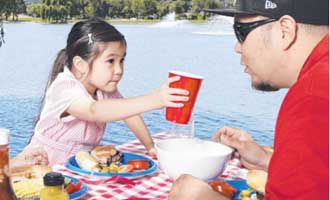孩子是否超重由父方决定
爱思英语编者按:肥胖会遗传,这个我们都知道,但以前我们总以为母亲生的,胖也赖母亲,却不知遗传事小,全赖爹。但到底这是遗传的因素还是父亲影响孩子行为所决定的呢?
Dads Determine Dhild Obesity
Research shows dad, not mum, is the big risk factor for childhood obesity

A recent Australian study has found having an overweight father quadruples a child's chance of being overweight, even if they have a mother of normal weight.
Interestingly, the reverse scenario doesn't have the same result. So if the mother is overweight but the father is of normal weight, the child's risk of being overweight is not significantly raised.
The study was undertaken by researchers at the University of Newcastle, who examined more than 3000 two-parent families over a four-year period. Researchers measured the children's change of weight from about four to five years of age to when they were eight or nine.
Dr Emily Freeman, a researcher with the University of Newcastle Family Action Centre, says while it is early days in terms of this type of research, the results of the study are very exciting.
"It's really important we've found this link, because a lot of the research tends to focus on mothers and children," she says. "We've had lots of stories of dads refusing to eat vegetables, then the kids don't eat them either."
She says further research is needed to understand the underlying reasons for the link.
Making a change
So what can fathers do to become better role models for their kids?
"They should definitely be more aware of the different behaviours they are modelling to their kids; they need to demonstrate they're eating fruit and vegies and get outside more," says Dr Freeman, who has been involved with Healthy Dads, Healthy Kids, an education program in the Hunter Valley in NSW, and has seen these actions bring encouraging results.
"It doesn't have to be formal organised sport activities – even kicking a football around or taking the kids to the park is fantastic. It's an opportunity for dads to spend more time with their children."
Easy tips for getting active with kids
* Plan a family day out at your local pool.
* On wet days, put on your gumboots and go out for a splash in the puddles.
* Organise a family bike ride.
* Involve kids in physical activities around the home, such as gardening or washing the car.
* Walk to nearby shops together instead of driving.
* Fly a kite on windy days.
* Encourage organised sports. Watch kids compete and provide positive feedback.